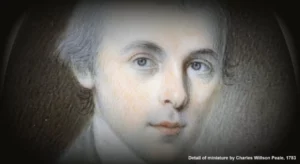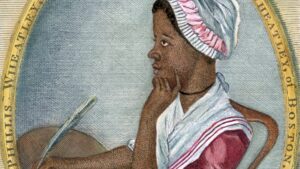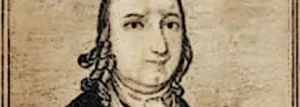Americanism Redux
November 9, 1772, 250 years ago today
The youth and their futures as the skies of today turn gray and cold.
21-year old James Madison writes from his family’s Virginia plantation home to a friend he’d known in college. Madison thanks him for his friendship and for staying in close contact via letters. He congratulates his friend on a decision to continue self-improvement through “a judicious choice of History and the Science of Morals.” Madison suggests his friend add “divinity” to his studies for the upcoming winter. Be sure to hold fast to your study, he warns, a town with a lot of other people, like the one you’re in, makes for distractions and downfalls. Madison remarks that he doesn’t expect to live long because of vulnerability to disease. My life, he says, will be short. Madison closes the letter by noting that he’s teaching literature to his brothers and sisters.
19-year old Phillis Wheatley, a black poet who is still enslaved by a family in Boston, Massachusetts, has collaborated with one of her enslavers, Susanna Wheatley, to arrange a most astonishing meeting in Boston. Phillis’s poems have been printed and circulated in Boston but local leaders don’t believe a black teenage girl could write so well. Phillis and Susanna have appeared before a panel of self-appointed judges to prove the girl’s abilities. The panel accepted that Phillis is an authentic poet. Still, Phillis and Susanna are not convinced it will make any real difference for Phillis’s publications. They’re mulling over a potential voyage to England where Susanna is confident her network of relationships can advance Phillis’s calling as a poet.
Jemima Wilkinson is 20-years old and living in Rhode Island, not far from Phillis Wheatley. She is a Quaker and from a family of Quakers. Her cousin is colonial chief justice of Rhode Island, a fiery ally of Samuel Adams and others anti-imperial protestors in Boston and elsewhere. Jemima and her siblings—up to twelve at one point—are radical and unorthodox in the Quaker community. Jemima seeks the edges of many customs and conventions around her; she strains at religious, sexual, and social pathways that define her life in Rhode Island. Who knows—maybe she’ll stop using her own name, stop using “her” altogether. She reads, re-reads, recalls, and recites long passages from the Bible and Quaker writings, growing excited with a sense that a larger meaning is near. She gains calmness and connection in her time with animals.
James thinks he’ll die while he’s young. Phillis won’t allow others to restrict or reduce her creative writing. Jemima finds kindred souls when riding highly spirited horses.
Two futures await the three young adults, the one they see and the one ahead.
Also
Today, seven Russian warships destroy a Turkish fleet of the Ottoman Empire in the Gulf of Patras, Greece. The war has raged for the past four years. The Russian imperial government of Catherine the Great has succeeded in expanding its geographic span of influence into eastern and southeastern Europe. The doorstep of Mother Russia advances toward the northern Mediterranean Sea.
Advisors to Charles III in Madrid, Spain soon receive a long report written at the same time the naval battle off Greece occurs. The document is from New Spain, the vast Spanish holdings in the New World. Rafael Martinez Pacheco is the report’s author as commandant of La Bahia (now Goliad, Texas). He writes about the weakened conditions of the colonial province of Texas. Martinez points to corruption among governors and military officers as the prime cause of trouble. Martinez believes their corruption could result in serious challenges to local colonial authority. This must be addressed.
The future includes the fate of empires.
You Now
It’s not that the future is a mass of unknowns. It’s that the future is a mass of semi-known particles numbering in the millions and that in sequencing, combination, and collective effect defy knowing. Anything could happen, anything could break this way or that and unleash a state of things impossible to recognize. And, adding to it all, we will feel catapulted forward through time and brought face-to-face with a new sort of monster. The span of time between now and feeling the strange hot breath is, fearfully, pixel in length.
So we may do what James, Phillis, and Jemima did—we tend to draw ahead from the point we currently occupy. The distance is an arm’s reach or however long until the pen runs dry or the battery shows zero.
We also do the drawing inside an arrangement so gigantic you barely know it’s there. It’s a nation, a corporate market, a trade agreement, an invisible screen glowing with people of like minds and hearts, a set of pursuits and pleasures shared in common, an assumption in your head as to who you are and who all of them aren’t.
One day those futures are not only joined but they stop being the future. They mark the present and, from the mole-sized hill, you look back in wonder at the future you saw. Can it even still be seen?
Suggestion
Think of the one thing you truly want to know about the future, and then think about how far ahead that actually is. 








